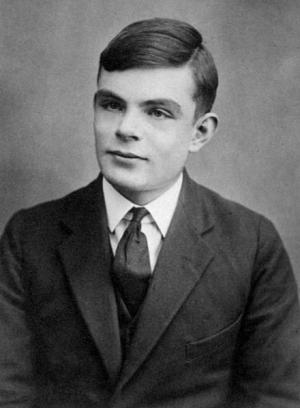Year born: 1912
Research Areas: Computer Programming, Artificial Intelligence
"May not machines carry out something which ought to be described as thinking but which is very different from what a man does?"
Source: Turing, A. (1950) Computing Machinery and Intelligence

Early Life
Alan was born in London, UK. From a young age he was interested in codes and ciphers and spent lots of time creating and solving puzzles. He studied mathematics at the University of Cambridge and got a PhD in mathematical logic from Princeton University.
Career Highlights
Alan worked for the Government Code and Cypher School at Bletchley Park during the Second World War. He was part of a team who were trying to decipher messages sent in code by German Enigma machines. Alan’s most famous achievement was to design a machine, the Bombe, that could break codes quicker than a human could. His work contributed to the Allied Forces winning the war.
Up until the 1970s, people who carried out mathematical calculations were called ‘computers’. In 1936, Alan had an idea for a machine that could carry out similar processes. This is like the idea of a computer program today. It was another nine years before technology had developed enough to test his ideas.
From 1945 to 1947, Alan worked at the National Physical Laboratory, where he designed the Automatic Computing Engine. In 1949, he became Deputy Director of the Computing Machine Laboratory at the Victoria University of Manchester. Alan began to work on a method to determine if a machine could be intelligent or not. He referred to it as the ‘imitation game’, but it is better known as the ‘Turing test’. Alan’s work paved the way for future research on artificial intelligence.
Legacy
Alan is considered one of the fathers of computer science. He was appointed an Officer of the British Empire in 1945 for his wartime services and was elected a Fellow of the Royal Society in 1951. A statue of Alan was unveiled in Manchester on 23 June 2001. A 2014 film called The Imitation Game was written about Alan's life.
In 1952, the police prosecuted Alan for homosexuality. Being gay was illegal in England from 1533 until 1967. In 2009, the British government publicly apologized for how Alan had been treated. Four years later Queen Elizabeth II granted Alan a royal pardon. Alan did not live to receive the pardon. He died in 1954.
Other Interests
Alan loved long-distance running and was very nearly part of the British Olympic team. He also played chess and liked to carry out chemistry experiments.
